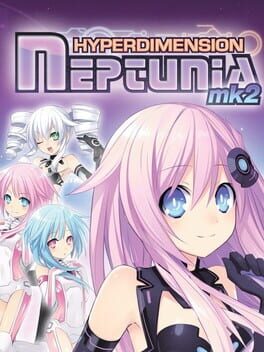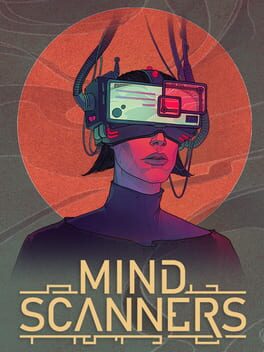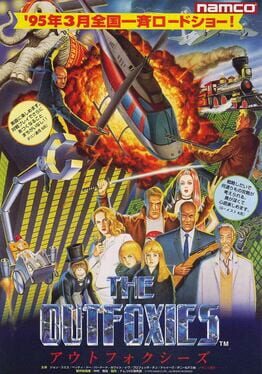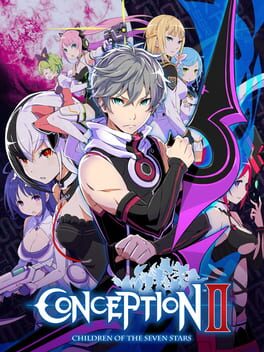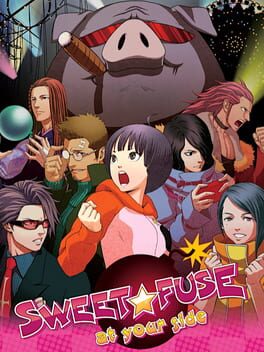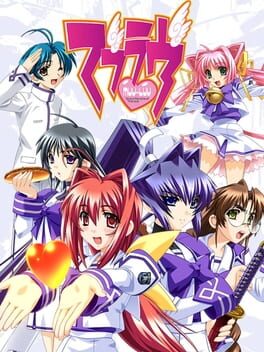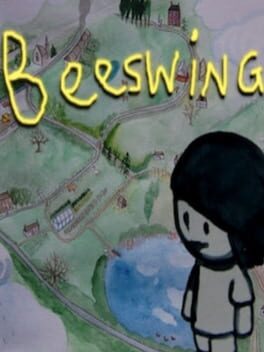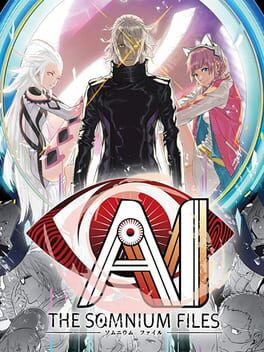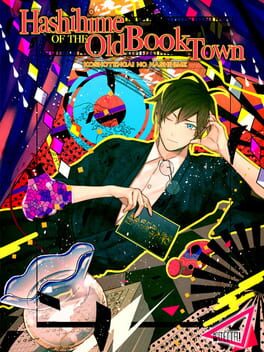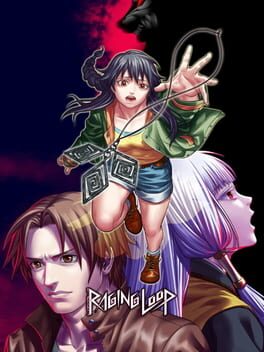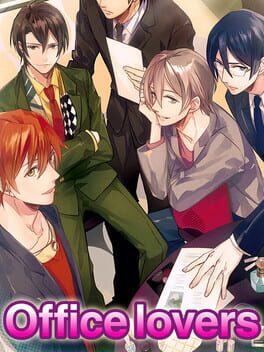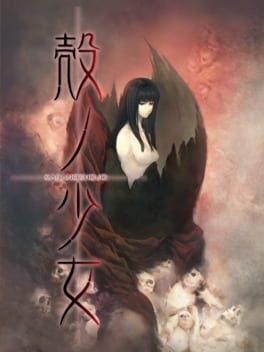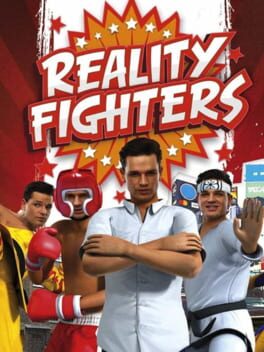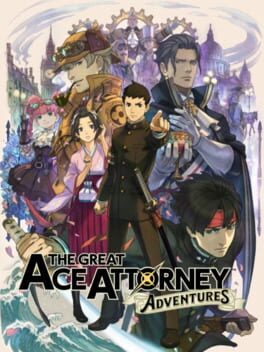Texhs
I'm writing this because I just finished watching Food4Dog's video talking about how she, a 60+ year old woman, got into video games, and she cited this game as being really important to her while she was dealing with a heavy depression and how this game's charm made her smile during that time. And, well, I can attest to a similar story.
Back in 2012 or so, my family agreed to sell the Xbox 360 and get a PS3. I was in my sophomore year of high school, going through a deep depression and only beginning to get help with some anxiety disorders, and I picked this game up on a whim along with some other anime-looking games that were exclusive to the PS3 to see what I was missing out on. Didn't care that the battle system wasn't well-balanced, didn't care that the assets were recycled heavily, didn't care about the indulgence in anime tropes: I couldn't help but feel happy playing this game. It was unabashedly weird and opened up a world of more niche Japanese gaming I hadn't heard of before: for instance, this title in particular was the first time I ever heard of Falcom.
Neptunia has a reputation as a fanservice-y kusoge, and I don't think any of its fans will try to argue that it's objectively a great game series. But it's an important series for me and others as a lighthearted, comfort-food JRPG that lead us to discovering several other games, some of greater quality. Even "dumb" stuff can still be meaningful to the right person.
Back in 2012 or so, my family agreed to sell the Xbox 360 and get a PS3. I was in my sophomore year of high school, going through a deep depression and only beginning to get help with some anxiety disorders, and I picked this game up on a whim along with some other anime-looking games that were exclusive to the PS3 to see what I was missing out on. Didn't care that the battle system wasn't well-balanced, didn't care that the assets were recycled heavily, didn't care about the indulgence in anime tropes: I couldn't help but feel happy playing this game. It was unabashedly weird and opened up a world of more niche Japanese gaming I hadn't heard of before: for instance, this title in particular was the first time I ever heard of Falcom.
Neptunia has a reputation as a fanservice-y kusoge, and I don't think any of its fans will try to argue that it's objectively a great game series. But it's an important series for me and others as a lighthearted, comfort-food JRPG that lead us to discovering several other games, some of greater quality. Even "dumb" stuff can still be meaningful to the right person.
2021
Mind Scanners wants to be A Very Important Game about the moral ambiguities of treating psychological disorders but it fails to really say much beyond "treat the illness, not the personality", which might sound deep to somebody in a Psychology 101 class but I'm a psych grad looking for a master's right now and I thought it was just kind of toothless. It doesn't really help that the minigames are very abstract and don't remotely resemble any real psychiatric treatments; this game gets compared to "Papers Please" a lot but what worked there was that the dehumanizing procedures you were asked to perform felt realistic and that's what was so uncomfortable about them.
That said, there is a good representation of the unique relationship a social worker can have with their clients. You need to have the proper emotional distance from them to treat them properly, and yet you can't help but find some people endearing. Occasionally the game brushes up against the more interesting idea during this of "what if somebody's abnormal mental functioning is actually beneficial" but it isn't iterated on enough to feel pointed.
That said, there is a good representation of the unique relationship a social worker can have with their clients. You need to have the proper emotional distance from them to treat them properly, and yet you can't help but find some people endearing. Occasionally the game brushes up against the more interesting idea during this of "what if somebody's abnormal mental functioning is actually beneficial" but it isn't iterated on enough to feel pointed.
1995
I actually got to play this on a arcade cabinet! Outfoxxies represents a diametric opposite of competitive Smash Bros. in terms of its design as a platform fighter. Melee attacks do little-to-no damage and combos are nonexistent in favor of item drops doing the bulk of the damage; the stages are so large and difficult to traverse they make New Pork City look quaint; so much is happening on-screen at any given time that it’s impossible to take everything in at once without some sort of sensory overload. Outfoxxies laughs at the need for other fighting games to be “fair” and “balanced” and instead delivers a uniquely manic experience that is equal parts frustrating and mesmerizing.
I love the espionage-thriller aesthetics paired with some goofy characters and stages. You have John Smith and Betty Doe to select if you want to play the assassin role straight… or you can play as the chimpanzee or pair of homicidal twins, fighting in the middle of a circus show. Suda51’s love for this game makes so much sense. I was so enamored by this wonderfully weird, dark sense of humor that I kept pushing through even when I lost and felt frustrated because I really wanted to see what oddities the game would throw at me on the next stage. The style is the substance, and I think everybody owes it to themselves to try this game once, preferably with friends, even if my description of the gameplay sounds unpleasant to you.
I love the espionage-thriller aesthetics paired with some goofy characters and stages. You have John Smith and Betty Doe to select if you want to play the assassin role straight… or you can play as the chimpanzee or pair of homicidal twins, fighting in the middle of a circus show. Suda51’s love for this game makes so much sense. I was so enamored by this wonderfully weird, dark sense of humor that I kept pushing through even when I lost and felt frustrated because I really wanted to see what oddities the game would throw at me on the next stage. The style is the substance, and I think everybody owes it to themselves to try this game once, preferably with friends, even if my description of the gameplay sounds unpleasant to you.
I remember buying this game when it first released in high school and trying to justify it to my friend group as “lol wacky Japanese VN with Keiji Inafune!!!” only to really get into the romantic aspects and was the first step to unlocking my long-repressed desire to smooch dudes. I still even have the pre-order necklace even though it’s way too small for my neck. Speaking of Keiji Inafune, kind of funny how poorly this game aged considering how hyped up Inafune is as being this master game designer in the script when Mighty No. 9 demolished his reputation just a few years later. Thankfully not uncomfortable, just deeply ironic.
Anyway it’s nothing too special for an otoge besides Inafune, it’s definitely more about having fun with all the wild amusement park death traps instead of developing some deeper themes, which is totally fine with as it’s pretty self-aware of its status as campy entertainment. As per usual for Otomate, some routes are duds but I’d say only one is actually creepy, and the good routes make up for it. Mitarashi best boy, I’m a sucker for brash hunks with a secret romantic side.
Anyway it’s nothing too special for an otoge besides Inafune, it’s definitely more about having fun with all the wild amusement park death traps instead of developing some deeper themes, which is totally fine with as it’s pretty self-aware of its status as campy entertainment. As per usual for Otomate, some routes are duds but I’d say only one is actually creepy, and the good routes make up for it. Mitarashi best boy, I’m a sucker for brash hunks with a secret romantic side.
Look, this game doesn't match the original Nier to me. I think the rearranged OST is a definite downgrade from the original, even if some of the tracks do achieve parity with their originals, and visually the world doesn't strike me with the same sense of melancholy and hollowness by refining what was artistically crude. I also don't really like that Nier now plays like 2B - I may enjoy Automata's combat more than the original Nier, but I appreciate that Nier had his own distinct combat style that suited his personality and circumstances that is now lacking here.
But even if some of the magic is lost - it's still a damn good game. It took some hours for me to accept that this is not the Nier I knew and loved, but by the time I got to the second playthrough and many scenes still hit me effectively like the original, I was able to come to terms that this game will never replace the original for me, but it's still a pretty solid, alternative take on the same material. I overall like the new story content, I think it fits in line thematically with the original and the only thing I don't care for are the numerous Automata references, it feels like the devs were unsure this game could stand on its own (the fact that you can unlock Automata's OST but not the original arrangements is absolutely criminal).
I guess what I'm trying to say is, this is far from the worst remake in the world; even if it doesn't feel exactly the same as the original, there's still still a reverence for what it accomplished that Toybox tried to capture.
But even if some of the magic is lost - it's still a damn good game. It took some hours for me to accept that this is not the Nier I knew and loved, but by the time I got to the second playthrough and many scenes still hit me effectively like the original, I was able to come to terms that this game will never replace the original for me, but it's still a pretty solid, alternative take on the same material. I overall like the new story content, I think it fits in line thematically with the original and the only thing I don't care for are the numerous Automata references, it feels like the devs were unsure this game could stand on its own (the fact that you can unlock Automata's OST but not the original arrangements is absolutely criminal).
I guess what I'm trying to say is, this is far from the worst remake in the world; even if it doesn't feel exactly the same as the original, there's still still a reverence for what it accomplished that Toybox tried to capture.
2003
Really tired of the slander that the Extra scenario constantly receives as “the bad part you have to sit through before you get to the good stuff”! It’s very self-aware of the harem romcom tropes that are liberally invoked and often exaggerates them to parodic levels, but never ironic as there’s plenty of sincerity to be found in the girls’ endings. That self-awareness helps give the girls an extra depth that allow them to function and develop in the far more serious Unlimited and Alternative scenarios, even if they don’t fully break away from their archetypes. So many seemingly cliche scenes in Extra are iterated upon to powerful effect in Alternative as well as some interesting genre meta-commentary achieved later by juxtaposing the alien war epic that develops to its romcom roots. Extra is not the best of its genre, and it won’t win anybody over who is already predisposed against this kind of premise, but it is so critical as a baseline to establish the stakes of what Takeru is fighting to return to and the story’s characters, and ages wonderfully the further you get into the trilogy.
The Unlimited scenario, despite expectations, is more straightforward with what it’s trying to accomplish. It’s a transitionary point tonally between Extra and Unlimited, still containing many SoL scenes despite the threat of the BETA invasion being introduced, and in some ways is even funnier than Extra due to the sharp contrast. The aliens loom in the background but never appear on screen at this point, allowing Takeru and the player to gradually lower their guard as the outlook becomes more optimistic until the ending delivers a swift gut punch. Despite having his suburban life taken from him, Takeru is still sheltered in this timeline, and does not yet understand real hardship.
A lot of the more thematic material doesn’t fully materialize until Alternative, but the seeds are planted. That does make this title hard to evaluate on its own since so much of it rides on the success of its sequel, but I think the careful planning is evident to an astute first-time reader, and the fun character dynamics can be appreciated on their own merits. Takeru’s assholery can be hard to tolerate at times but there’s plenty here to like and talking about this VN like it’s homework does a disservice to it.
The Unlimited scenario, despite expectations, is more straightforward with what it’s trying to accomplish. It’s a transitionary point tonally between Extra and Unlimited, still containing many SoL scenes despite the threat of the BETA invasion being introduced, and in some ways is even funnier than Extra due to the sharp contrast. The aliens loom in the background but never appear on screen at this point, allowing Takeru and the player to gradually lower their guard as the outlook becomes more optimistic until the ending delivers a swift gut punch. Despite having his suburban life taken from him, Takeru is still sheltered in this timeline, and does not yet understand real hardship.
A lot of the more thematic material doesn’t fully materialize until Alternative, but the seeds are planted. That does make this title hard to evaluate on its own since so much of it rides on the success of its sequel, but I think the careful planning is evident to an astute first-time reader, and the fun character dynamics can be appreciated on their own merits. Takeru’s assholery can be hard to tolerate at times but there’s plenty here to like and talking about this VN like it’s homework does a disservice to it.
2014
When I was a young kid, I didn't want to move away from my small hometown to a city in another state. This small town was my world, and even though my parents kept telling me where we were going was a better place with more opportunities, I didn't want to listen. Over time, though, I did settle into our city, coming to love the setting until my family announced when I was a young adult that we were moving back to our hometown. Ironically, I felt the same sort of dread I felt as a kid, except now I had a greater deal of perspective. Having my college career on pause while worked a shitty retail job to hopefully support myself, revisiting old locations I used to visit all the time as a kid and realizing the hidden stories to them and the people I knew, there was a very interesting mix of melancholy and nostalgia I experienced.
I relate this to say, I found the emotions present in Jack King-Spooner's anecdotes of his hometown to be incredibly similar to my own. These small towns aren't nearly as romantic as many writers want you to believe, but it's also hard to re-examine these people you once felt a strong affinity to with a sense of pessimism, even when having the perspective of the world beyond this small locale ruins your ability to view things through the same gaze of wonder you once felt.
I don't think there's a grand mission statement to this, it simply is what it is. Leaving the town, and thus ending the game, feels anticlimactic on purpose. What are you supposed to do with this new perspective? Maybe it's best to let the past be the past and move on in life.
I relate this to say, I found the emotions present in Jack King-Spooner's anecdotes of his hometown to be incredibly similar to my own. These small towns aren't nearly as romantic as many writers want you to believe, but it's also hard to re-examine these people you once felt a strong affinity to with a sense of pessimism, even when having the perspective of the world beyond this small locale ruins your ability to view things through the same gaze of wonder you once felt.
I don't think there's a grand mission statement to this, it simply is what it is. Leaving the town, and thus ending the game, feels anticlimactic on purpose. What are you supposed to do with this new perspective? Maybe it's best to let the past be the past and move on in life.
I just finished watching wingupingu play the game after having first played it myself over a year ago, and he posted some thoughts here himself, go check it out. I liked AI when I first played it, but I also found it to be somewhat overhyped and this watch confirmed it to me. Don’t get me wrong, I think there’s some incredibly witty writing and it still evoked plenty of laughs from me the second time around, and I continue to appreciate the themes of familial love presented in Ota’s and Mizuki’s routes. The final Somnium in Ota’s route is probably the most vivid memory of the game I’ve had for its emotional impact and it still got me worked up, although it didn’t help that it tied into a personal experience I had earlier this year.
On the other hand, Iris may be entertaining as a character, but I found her actual relevance to the plot kind of weak. I know people like to meme on that one guy who review-bombed the game for all the bad stuff that happens to Iris, but she really does lack agency for the main heroine and there’s a few parts of her suffering that seem pretty tangential to the main plot, existing mainly to prompt pity. Apparently her mother Hitomi was originally written to be the main heroine until she was swapped out for Iris, and you can really feel the struggle to justify Iris having a large role despite not having much direct involvement with the actual plot.
The true ending also kind of drags due to an abundance of flashbacks. I actually really do like a few emotional scenes during the true end route, but it does get drowned out by some contrived plot twists. AI tries a little too hard to make a happy ending as possible for everybody involved, and while I wouldn’t say it’s tonally incoherent with the lighthearted sections from earlier in the game, it does cause some stuff to lose impact.
This probably makes it sound like I dislike AI when I really don’t. I don’t think it’s wrong for a game like AI to be easily digestible and more focused on making the player smile than being difficult to decipher or thematically dense. But I’ve also seen enough people gush on the positive sides of this game that I don’t feel the need to join the choir, rather addressing some of the shortcomings I don’t really see people talk about as much. It’s a fun time, just don’t let the hype overtake you.
On the other hand, Iris may be entertaining as a character, but I found her actual relevance to the plot kind of weak. I know people like to meme on that one guy who review-bombed the game for all the bad stuff that happens to Iris, but she really does lack agency for the main heroine and there’s a few parts of her suffering that seem pretty tangential to the main plot, existing mainly to prompt pity. Apparently her mother Hitomi was originally written to be the main heroine until she was swapped out for Iris, and you can really feel the struggle to justify Iris having a large role despite not having much direct involvement with the actual plot.
The true ending also kind of drags due to an abundance of flashbacks. I actually really do like a few emotional scenes during the true end route, but it does get drowned out by some contrived plot twists. AI tries a little too hard to make a happy ending as possible for everybody involved, and while I wouldn’t say it’s tonally incoherent with the lighthearted sections from earlier in the game, it does cause some stuff to lose impact.
This probably makes it sound like I dislike AI when I really don’t. I don’t think it’s wrong for a game like AI to be easily digestible and more focused on making the player smile than being difficult to decipher or thematically dense. But I’ve also seen enough people gush on the positive sides of this game that I don’t feel the need to join the choir, rather addressing some of the shortcomings I don’t really see people talk about as much. It’s a fun time, just don’t let the hype overtake you.
I’m sorry, I really wanted to dig this one more than I actually did. “Gay psychedelic time-traveling murder mystery” is exactly my kind of jam but… well, I think the first two routes are pretty fun. Minakami has a pretty good romantic arc, and I didn’t dig Kawase as a character as much but his route still had some pretty crazy stuff going on that kept me hooked. But then Hanazawa’s route happened, and despite his route being considerably shorter, this is where the game really started to drag for me. From here on, the love interests are mostly lacking in charisma and the storyline loses some of the creativity it displayed previously. It’s still pretty bonkers but it feels restrained after basically going all-out at the start. The Professor’s route picks up a bit but it still left me with a feeling of disenchantment.
The final route is incredibly controversial, and while I’ve defended big twist finales like it in other VNs, I just can’t bring myself to go to bat for this one. There’s this interesting idea about escapism that could be explored but the ending is way too short, stops itself before it could actually develop any follow-up on the implication of the twist. There’s also some stuff that’s pretty ”yikes” and is seemingly unaware of it, and that keeps me from having a reparative view on the more “problematic” elements of this ending. All that being said, I can see and respect how somebody could love Hashihime even with its flaws. There’s a lot of big ideas at play about the relationship people have with fiction and what it takes to be an artist that don’t feel capitalized on, but I can see someone appreciating nonetheless.
The final route is incredibly controversial, and while I’ve defended big twist finales like it in other VNs, I just can’t bring myself to go to bat for this one. There’s this interesting idea about escapism that could be explored but the ending is way too short, stops itself before it could actually develop any follow-up on the implication of the twist. There’s also some stuff that’s pretty ”yikes” and is seemingly unaware of it, and that keeps me from having a reparative view on the more “problematic” elements of this ending. All that being said, I can see and respect how somebody could love Hashihime even with its flaws. There’s a lot of big ideas at play about the relationship people have with fiction and what it takes to be an artist that don’t feel capitalized on, but I can see someone appreciating nonetheless.
2015
I never expected Kemco of all companies to put out a game so fantastic, since the most I’ve heard about the companies was that they shoveled out sprite JRPGs that many considered “kusoge”. My expectations were a little low even after hearing some good things about this title, so I was completely blown away by the level of ambition and the incredible atmosphere of tension sustained by strong horror writing and a very fitting art style. I was gripped quickly and finished this in a matter of days because the suspense was unbearable, I simply needed to know how the next conference was going to go.
Structurally, it’s the antithesis to Gnosia, another popular game based on Werewolf mechanics. While Gnosia featured randomly generated Werewolf scenarios that relied on passing stat checks and could be cleared in a matter of minutes, Raging Loop features three pre-defined scenarios, traditional VN choices and are a lot meatier in content. I much prefer this approach, as Gnosia can start to feel lifeless after you learn how to game the algorithm and you see all the repeated dialogue. Here, each scenario is incredibly well-crafted with much attention paid to how the characters respond differently when they’re assigned different roles and how their existing relationships affect their suspicions of each other.
I really do want to emphasize just how great the characters are. A lot of the cast can seem pretty unlikable at first glance, especially during the first loop where several people are very untrusting of protagonist Haruaki, but they’re all incredibly dynamic as different sides come out during the loops and they all reveal themselves to be pretty compelling people. I personally liked Chikamochi, a weird kid who at times I really enjoyed and other times I was incredibly annoyed by but still felt a lot of affection for him, and Haru, who I initially wrote off as a bratty teenage girl until later on when I found an incredibly relatable side to her. The true ending works for me because of how much of it is built off of the attachments the player forms towards these characters, and it carries the ending despite a couple of twists being just a tad deflating.
Also, this VN surprisingly has a lot of replay value! Replaying the game after seeing the true ending lets you view several new scenes where Haruaki wasn’t present, get extra commentary on bad endings, and even adds a couple of additional endings. None of it is really necessary but it’s all good stuff and it gave me the chance to spend a few more hours with this incredible cast. The amount of effort put into it is very appreciable, especially since this game is pretty lengthy even without any of this content.
Structurally, it’s the antithesis to Gnosia, another popular game based on Werewolf mechanics. While Gnosia featured randomly generated Werewolf scenarios that relied on passing stat checks and could be cleared in a matter of minutes, Raging Loop features three pre-defined scenarios, traditional VN choices and are a lot meatier in content. I much prefer this approach, as Gnosia can start to feel lifeless after you learn how to game the algorithm and you see all the repeated dialogue. Here, each scenario is incredibly well-crafted with much attention paid to how the characters respond differently when they’re assigned different roles and how their existing relationships affect their suspicions of each other.
I really do want to emphasize just how great the characters are. A lot of the cast can seem pretty unlikable at first glance, especially during the first loop where several people are very untrusting of protagonist Haruaki, but they’re all incredibly dynamic as different sides come out during the loops and they all reveal themselves to be pretty compelling people. I personally liked Chikamochi, a weird kid who at times I really enjoyed and other times I was incredibly annoyed by but still felt a lot of affection for him, and Haru, who I initially wrote off as a bratty teenage girl until later on when I found an incredibly relatable side to her. The true ending works for me because of how much of it is built off of the attachments the player forms towards these characters, and it carries the ending despite a couple of twists being just a tad deflating.
Also, this VN surprisingly has a lot of replay value! Replaying the game after seeing the true ending lets you view several new scenes where Haruaki wasn’t present, get extra commentary on bad endings, and even adds a couple of additional endings. None of it is really necessary but it’s all good stuff and it gave me the chance to spend a few more hours with this incredible cast. The amount of effort put into it is very appreciable, especially since this game is pretty lengthy even without any of this content.
2014
2008
A game about a quest for identity, fittingly set in the reconstruction period after WW2 when Japan struggled to regain a sense of cultural identity following the downfall of the Japanese empire. There's a permanent feeling of melancholy as characters struggle to find direction, often searching for external factors to justify themselves rather than looking within. It's not always the easiest read, not just because of the upsetting and ugly content but also the amount of repetition and the practical need for a walkthrough, but I definitely found myself captivated by this portrayal of 1950s Tokyo. Absolutely worth a read for anybody interested in VNs.
2012
Might be experiencing a bit of hype backlash but, I thought this game was just okay. To start with what I liked, I think there’s some really interesting ideas touched upon, many have already spoken about the depictions of anti-Japanese racism within the game but what’s more interesting is how the writing wrestles to come to terms with the rampant racism that was prevalent in this era of detective fiction that it takes so heavy inspiration from. We all have our problematic muses, and GAA is keenly aware of how romanticized the stories it looks up to are in hindsight.
Case 3 is also pretty incredible, featuring a jaw-dropping twist that calls into question one of the basic assumptions made in the series in a way that only works with Ryunosuke as the protagonist, and not Phoenix. Still, the potential fallout doesn’t quite feel fully capitalized on, leaving what could have been a truly transformative moment for Ryunosuke into a mere bump in the road.
What I end up finding myself sorely disappointed in, is the actual cases themselves. Outside of case 3, the cases featured in this game are incredibly simple and straightforward, with the writing holding your hand and all but telling you what you need to look at every step of the way. It’s the easiest game in the series, and the cases often feel incredibly drawn out. Case 5, in particular, is my least favorite final case in the entire series for how anticlimactic it is.
I’m well aware that this is meant to lead into GAA2, and from what I’ve played of 2 so far, it’s been everything I wanted 1 to be. Still, the potential for interesting explorations of ideas, and the likability of the main cast, can’t fully save the game from the dullness of the episodic cases. Not bad, but man did I feel disappointed.
Case 3 is also pretty incredible, featuring a jaw-dropping twist that calls into question one of the basic assumptions made in the series in a way that only works with Ryunosuke as the protagonist, and not Phoenix. Still, the potential fallout doesn’t quite feel fully capitalized on, leaving what could have been a truly transformative moment for Ryunosuke into a mere bump in the road.
What I end up finding myself sorely disappointed in, is the actual cases themselves. Outside of case 3, the cases featured in this game are incredibly simple and straightforward, with the writing holding your hand and all but telling you what you need to look at every step of the way. It’s the easiest game in the series, and the cases often feel incredibly drawn out. Case 5, in particular, is my least favorite final case in the entire series for how anticlimactic it is.
I’m well aware that this is meant to lead into GAA2, and from what I’ve played of 2 so far, it’s been everything I wanted 1 to be. Still, the potential for interesting explorations of ideas, and the likability of the main cast, can’t fully save the game from the dullness of the episodic cases. Not bad, but man did I feel disappointed.
